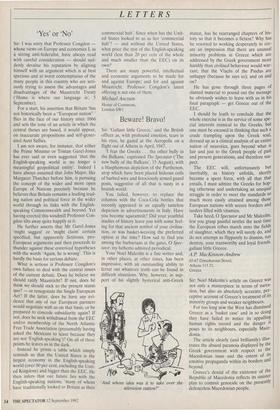LETTERS 'Yes' or 'No'
Sir: I was sorry that Professor Congdon — whose views on Europe and economics I, as a strong anti-federalist, have always read with careful consideration — should sud- denly devalue his reputation by aligning himself with an argument which is at best specious and at worst contemptuous of the many people in this country who are seri- ously trying to assess the advantages and disadvantages of the Maastricht Treaty ('Home is where our language is', 5 September).
For a start, his assertion that Britain 'has not historically been a "European nation" ' flies in the face of our history since 1066 and sets the tone of an article in which the central theses are based, it would appear, on inaccurate propositions and self-gener- ated Aunt Sallies.
I am not aware, for instance, that either the Prime Minister or Tristan Garel-Jones has ever said or even suggested 'that the English-speaking world is no longer a meaningful geopolitical entity'. Indeed I have always assumed that John Major, like Margaret Thatcher before him, is pursuing the concept of the wider and more open Europe of Nations precisely because he believes that Britain remains a leading trad- ing nation and political force in the wider world through its links with the English- speaking Commonwealth and beyond. Yet having erected this windmill Professor Con- gdon tilts away quite happily at it.
He further asserts that Mr Garel-Jones 'might suggest' or 'might claim' certain specified, but apparently fictitious, pro- European arguments and then proceeds to thunder against these contrived hypotheses with the words 'Again, he is wrong'. This is hardly the basis for serious debate.
What is serious is Professor Congdon's own failure to deal with the central issues of the current debate. Does he believe we should ratify Maastricht? If not, does he think we should stick to the present status quo? — or renegotiate the Single European Act? If the latter, does he have any evi- dence that any of our European partners would negotiate with us on that basis, or be prepared to concede subsidiarity again? If not, does he seek withdrawal from the EEC and/or membership of the North Atlantic Free Trade Association (presumably having asked the Mexicans to leave because they are not 'English-speaking')? On all of these points he leaves us in the dark.
Instead he prints a table which simply reminds us that the United States is the largest economy in the English-speaking world (over 80 per cent, excluding the Unit- ed Kingdom) and bigger than the EEC. He then infers that our future lies with the English-speaking nations, 'many of whom have traditionally looked to Britain as their commercial hub'. Since when has the Unit- ed States looked to us as her 'commercial hub'? — and without the United States, what price the rest of the English-speaking world (less than 20 per cent of the whole and much smaller than the EEC) on its own?
There are many powerful, intellectual and economic arguments to be made for and against Europe; and for and against Maastricht. Professor Congdon's latest offering is not one of them.
Michael Ancram
House of Commons, London SW1


































































 Previous page
Previous page